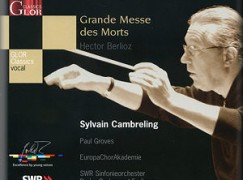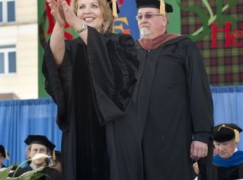San Francisco’s New Century Chamber Orchestra has named Philip Wilder as its new executive director. New Century’s music director is the ever-interesting Nadja Salerno-Sonnenberg.
Wilder, a singer with Chanticleer, worked for seven years as an artist PR with 21C Media Group. Guess he’s got good contacts.

When the late Richard Hickox conducted the nine Vaughan Williams symphonies with the Bournemouth orchestra in the mid-1990s it was thought to be the first time the cycle had been performed complete.
Wrongly.
It now appears that Gennady Rozhdestvensky, that indefatigable Anglophile, had conducted the series in Leningrad a few years earlier, in 1988-89. Those performances have just been released on record. They are intriguing, illuminating, vitally uplifting.
They are my Album of the Week on sinfinimusic.com.
Click here to read and listen. You may never hear RVW with the same ears again.

The French conductor Sylvain Cambreling, longtime companion of the director Gerard Mortier, has switched from ICA Artists to Hazard Chase.
It looks like his personal agent, Peter Railton, has jumped ship and he’s going along for the ride.

Daniel Lelchuk has played principal cello at the Castleton Festival for the past five years. Here are his thoughts on the maestro’s death:
Maestro Lorin Maazel died yesterday, Sunday July 13th 2014. In the afternoon the Castleton Festival Orchestra performed a concert with three of his compositions on the program. Playing as soloist in ‘The Giving Tree’ hours after his death with his whole family in the front row in the splendid theatre he had built on his own property was an intense, almost surreal experience.
That Maestro Maazel was one of the great gifts to the music world and the larger cultural world of the past century is obvious; what might be less so was his commitment to the future of our profession. He did not simply say he cared about the future after his death like so many casually do– he actually did something, and created a place on his farm in rural Virginia where young professionals could come and work with him daily preparing operas and symphonic concerts to his exacting standards.
Unlike other festivals where big-name conductors jet in for a dress rehearsal and concert, Maestro Maazel conducted almost every single rehearsal and performance up until this summer. Often one would spend five hours daily with him; his rehearsals were a marvel of efficiency, his knowledge and expressive abilities supreme.
I am beyond lucky not only to have played with him for the past five summers, but also to have been given the opportunity to play some of the great operatic ‘cello solos. The ‘cello solo at the end of Act I of ‘Otello’ is engraved in my memory– he was so linked to the singers and orchestra at the same time that he made the solo ‘cello line seem as if it were bound to the love of Desdemona and Otello.
Every gesture he made had musical significance. The ending of ‘Il Tabarro’ brought out a terror and desperation in his face that was shocking– it was as if he was witnessing the murder in real life. He was so beautiful and interesting to watch conduct one could hardly look away!

I also got to know him personally over the years. Last March after a chamber performance I spent all afternoon with him and my colleague Eric Silberger (above, left) talking, listening to him tell stories, watching videos on Youtube and listening to Sarah Vaughan sing ‘Poor Butterfly.’ He had not heard the song before but adored it at once.
When I saw him first this summer, looking thinner and a little tired, he said “If only we could play duets together, even just the Handel/Halvorsen duo” (He, a super violinist, used to play that piece with the late Janos Starker at Castleton Farms, Virginia).
He elevated music making to incredible heights– when he looked up into the sky with his arms outstretched holding a fermata longer than anyone thought possible and somehow brought everyone up with him and down again, together!!– that was magic.
Daniel Lelchuk
Principal Violoncellist; Castleton Festival
Nora Gubich has pulled out of the world premiere of Marc-André Dalbavie’s opera, Charlotte Salomon, due to open on July 28.
Huge in France, the iconic mezzo has announced on Facebook that she has acute lower back pain and needs to spend four weeks in rehab.
No word from Salzburg on a replacement.

Fascinating article in the LA Times on orchestral musicians, one of the best pieces in years on the musical process. Tells it straight. No starry-eyed nonsense. Interesting stuff. Read here.

We’re saddened to read that Fazil Say, the controversial Turkish pianist and composer, has been fired as director of the festival he founded in Antalya. The town’s new mayor belongs to the ruling Islamo-fundamentalist party. Fazil, an avowed atheist, has been prosecuted in Turkey for the crime of heresy.
The mayor of Antalya has appointed the conductor Gürer Aykal as the festival’s new director.
Musicians should give it a miss.

Opera Singer Expands Repertoire With WTF Performance
Who else but Renee Fleming? Where else but the Williamstown Theatre Festival?
See the headline here.
Renee says: ‘It’s my first time with the WTF … I want to be busy, to be challenged.’

Lorin Maazel, who died yesterday, started out as a teenaged section player in Pittsburgh and wound up as music director of two of the Big Five – something very few maestros have achieved*. It is still too soon, and we’re still too shocked, to assess Maazel’s impact on the American orchestra. Moreover, almost every conclusion is immediately contradicted by an adversarial perspective. The legacy, however, is large.
Maazel, having stormed to success in Europe in the 1960s at the Deutsche Opera Berlin and the radio symphony orchestra (then known as RIAS), was named successor to Georg Szell at Cleveland in 1972, a post he held for a decade. Following Szell was an impossible task, though not a thankless one. Musicians heaved a sigh of relief at the removal of Szell’s withering glare and acid tongue.
But the players were not consulted about the succession and most would have preferred the brilliant Hungarian, Istvan Kertesz. Maazel brought vigour, new faces and international swagger. But he made few friends, in the orchestra or the city, and the first local obituary today reflects that he ‘tended to polarise the Cleveland musical community’. He was succeeded by the harmonious figure of Christoph von Dohnanyi.

Maazel returned to Europe in 1982 to head the Vienna State Opera. When the job went sour after three years he returned to the US as music director of his hometown orchestra, in Pittsburgh. The city’s Post-Gazette reports today:
In 1988, the orchestra was old. Many of its members were Mr. Maazel’s former colleagues from his years as a section violinist. After four years without a music director, the PSO had become lethargic.
Mr. Maazel remade the orchestra seat by seat — 37 of them, according to the book “Play On: An Illustrated History of the Pittsburgh Symphony Orchestra” by Hax McCullough and Mary Brignano. The average age of PSO musicians plummeted. Many of those young musicians remain with the orchestra as principals and have come to define the PSO’s sound.
“His job was to attract the quality of players that would make the Pittsburgh Symphony once again a great orchestra,” said Robert Moir, senior vice president of artistic planning and audience engagement.
Maazel stayed eight years in Pittsburgh, before moving to Munich on the highest conductor wage in Europe. He was succeeded in Pittsburgh by Maris Jansons who, musicians hastened to tell me, ‘took the Maazel chill out of our playing’.
In 2002, Maazel succeeded Kurt Masur at the New York Philharmonic. Claudio Abbado and Riccardo Muti had previously turned down the job. In his opening week, he led the first-anniversary 9/11 concert with the premiere of John Adams’s On the Transmigration of Souls. Few regarded that as a cathartic moment. Maazel managed himself and the orchestra well, went on international tours, led an ill-advised mission to North Korea and drew near-relentless hostility throughout from the partisan New York Times. He lasted seven years.
It’s too soon to talk of legacy, but Maazel wrote a chapter in US orchestral history. The bulk of his US recordings belong to the Cleveland era and they give a good impression of how Maazel moved that ensemble from a central-European Szell sound to something more recognisably American.
—–
*The modern exception that springs to mind is Riccardo Muti (Philadelphia, Chicago)
Our picture was posted overnight by Cristina Fernandez de Kirchner, president of the debt-plagued, runner-up state of Argentina. She is faking a climactic moment with a distinguished guest who likes to squeeze the life out of failing states – those with which he shares a common border.
The instrument is a rather battered bandoneon. Vladimir Putin will have had no trouble picking out one of his favourite Party tunes.

We reported last night the death of Sandor Balint, a pivotal player in the Metropolitan Opera orchestra who led his colleagues’ contract negotiations for 23 years, up to the year 2000, and continued playing in the section to the end of his life. Sandy left, we hear, a manual of these negotiations, a ‘little black book’ of all the dirty tricks that get pulled when a massive institution tries to bring its employees to heel.
Musicians of the Met will invoke Sandy’s memory day by day in the countdown to a new agreement – or lockout – that must be reached by the end of this month.
There will be a wake for Sandy on Tuesday, 2-4 pm and 7-9 pm, at the Westchester Funeral Home, Inc., 190 Main Street, Eastchester, NY. 914-337-4585. There will be a short service for him at 10 am at the Funeral Home on Wednesday with burial at Woodlawn Cemetery in the Bronx.














